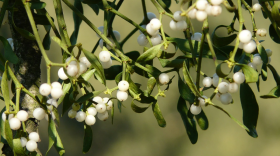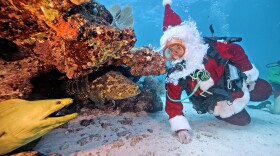TALLAHASSEE --- A California-based producer of lab-grown poultry filed a federal lawsuit Tuesday challenging a new Florida ban on selling or manufacturing “cultivated” meat.
UPSIDE Foods, Inc., contends, in part, that the law violates a constitutional prohibition on favoring in-state businesses over out-of-state competitors.
“We're not looking to replace conventional meat, which will always have a place on our tables,” Uma Valeti, a cardiologist who founded UPSIDE in 2015, said during a conference call Tuesday with reporters. “We want to give consumers a choice, a choice so they can eat cultivated meat or conventional meat, any choice they can make in the future to keep up with the demand for meat that will double by 2050.”
The lawsuit, filed in the federal Northern District of Florida, names as defendants state Agriculture Commissioner Wilton Simpson, Attorney General Ashley Moody and four state attorneys. Simpson, a key supporter of the law, called the lawsuit “ridiculous” and said “lab-grown meat is not proven to be safe enough for consumers.”
“Food security is a matter of national security, and our farmers are the first line of defense,” Simpson said in a statement. “As Florida’s commissioner of agriculture, I will fight every day to protect a safe, affordable, and abundant food supply. States are the laboratory of democracy, and Florida has the right to not be a corporate guinea pig. Leave the Frankenmeat experiment to California.”
The Legislature this year approved the ban as part of a broader Department of Agriculture and Consumer Services bill (SB 1084), which Gov. Ron DeSantis signed on May 1. The lawsuit said Florida became the first state to ban the manufacture, distribution and sale of cultivated meat.
“In doing so, Florida did not cite concerns that cultivated meat is less healthy or safe than conventional meat,” said the lawsuit, filed by attorneys from the Institute for Justice legal organization. “Instead, Governor DeSantis announced that Florida was ‘fighting back’ against the ‘authoritarian goals’ of the ‘global elite,’ who he alleged would force consumers to eat cultivated meat. The governor also announced that the law was part of his administration’s ‘focus on investing in our local farmers and ranchers’ and an effort to ‘save our beef.’”
The U.S. Food and Drug Administration and the U.S. Department of Agriculture last year approved UPSIDE to manufacture and sell its products. Since then, the company has distributed cultivated chicken products, an alternative to plant-based meat alternatives, at restaurants and tasting events across the nation, including in Florida.
“Laws like this in Florida will absolutely make sure that this innovation will go outside the United States and make it very challenging for us to have food safety and food security in the future,” Valeti said.
Paul Sherman, an Institute for Justice senior attorney, said a motion for a preliminary injunction is pending. If approved, a preliminary injunction could allow UPSIDE to sell products in Florida while the lawsuit moves forward.
“The states simply do not have the power to wall themselves off from products that have been approved by the USDA and the FDA,” Sherman said, referring to the federal agencies. “And if consumers don't like the idea of cultivated meat, there's a simple solution. They don't have to eat it. But they can't make that decision for other consumers.”
The other defendants in the lawsuit are Jack Campbell, the state attorney in the 2nd Judicial Circuit, which includes Leon and surrounding counties; Bruce Bartlett, the state attorney in the 6th Judicial Circuit, which is made up of Pinellas and Pasco counties; Andrew Bain, the state attorney in the 9th Judicial Circuit, which is made of up Orange and Osceola counties; and Katherine Fernandez Rundle, the state attorney in the 11th Judicial Circuit in Miami-Dade County. They are defendants because they would be expected to enforce the law.
The law, in part, makes it a second-degree misdemeanor to sell or manufacture cultivated meat. The manufacturing process includes taking a small number of cultured cells from animals and growing them in controlled settings to make food.
The lawsuit contends Florida’s ban violates the Supremacy Clause in the U.S. Constitution by pre-empting federal laws regulating meat and poultry products and violates what is known as the “dormant” Commerce Clause by insulating Florida agriculture from out-of-state competition.
For example, the lawsuit pointed to March comments by House bill sponsor Rep. Danny Alvarez, a Hillsborough County Republican who said, “If you believe that we are doing this because we know that Florida’s agriculture can hold us down and provides plenty of safe, quality beef and agricultural products — you are absolutely correct.”
Alabama followed Florida in approving a similar law, which doesn’t go into effect until Oct. 1. Similar bans have been proposed in states including Kentucky, Iowa, Pennsylvania and Texas.
UPSIDE, which would like to distribute its poultry products at Miami Beach’s Art Basel event in December and the 2025 South Beach Food and Wine Festival, contends Florida’s ban has affected the company’s revenue, promotional opportunities and reputation.
DeSantis traveled to rural Hardee County in May to sign the measure with members of the cattle industry on hand. While behind a podium that featured a sign saying, “Save Our Beef,” DeSantis said the law would protect against “an ideological agenda that wants to finger agriculture as the problem.”
DeSantis also called the products “fake meat” and said Florida was pushing “back against the global elite's plan to force the world to eat meat grown in a petri dish or bugs to achieve their authoritarian goals.”
The law doesn’t prohibit cultivated-meat research because of concerns that such a ban could affect Florida’s space industry, which is looking at cultivated meats for long-term space journeys.







